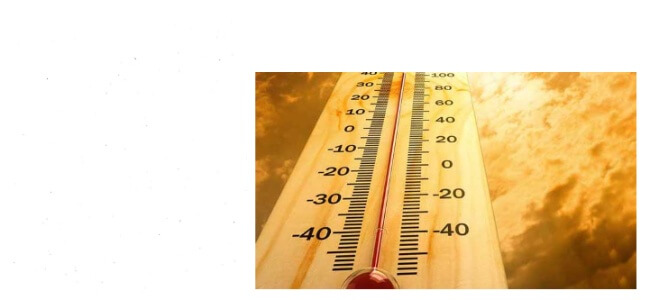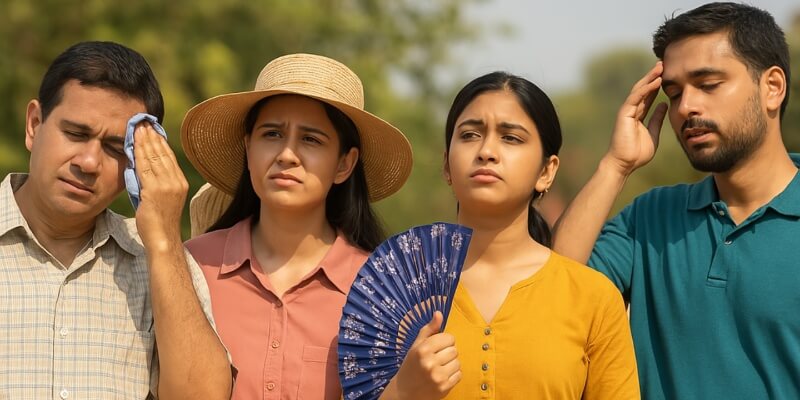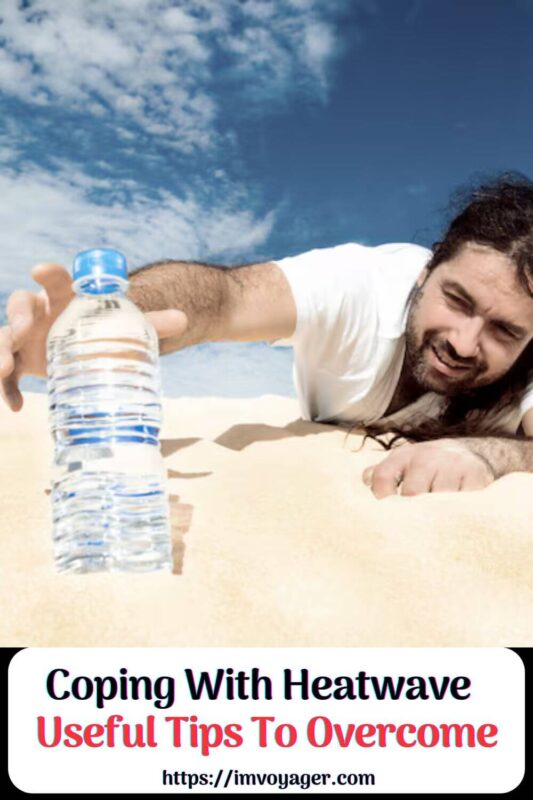Summer is a season of vibrancy, warmth, and outdoor adventures. It is a time when nature flourishes, and people embrace the sunshine with vacations, festivals, and leisure activities. However, the summer heat can also be intense, making it essential to take precautions to stay comfortable and safe. High temperatures and prolonged exposure to the sun can lead to dehydration, fatigue, and various health concerns.
The season also brings increased humidity, which can make the heat feel even more oppressive. As global temperatures continue to rise, heatwaves have become more frequent and severe. This post is dedicated to understanding heatwaves and learning effective ways to cope with extreme heat in the summer months.
Table of Contents
Summer Season
Summer is one of the most anticipated seasons of the year, bringing longer days and bright sunshine. It is a time when families go on vacations, children enjoy their school breaks, and outdoor activities peak. The season is characterized by high temperatures, often accompanied by dry weather in some regions and humid conditions in others. While summer is a season of joy and relaxation, it also demands that people take measures to stay safe in the heat.
Hydration becomes crucial as the body loses more fluids through perspiration. Proper clothing, sunscreen, and shade become essential to prevent sunburn and heat exhaustion. The intensity of the sun can have varying effects on different regions, with some experiencing mild warmth while others endure extreme heat. Urban areas often suffer from the heat island effect, making temperatures even higher. Farmers and outdoor workers are particularly vulnerable to heat stress, requiring extra precautions.
The season also sees a rise in heat-related illnesses, making awareness and preparedness necessary. Climate change has led to unpredictable weather patterns, making summers hotter than ever before. Understanding how to cope with the heat can make summer more enjoyable and safe for everyone.
Heatwave – What is Heatwave? | Understanding Heatwaves
A heatwave is a prolonged period of excessively high temperatures that can pose serious health risks. It occurs when temperatures remain significantly above normal for consecutive days, often accompanied by high humidity. Heatwaves can lead to dehydration, heat exhaustion, and even life-threatening conditions like heat stroke. They are more dangerous in urban areas where concrete and asphalt retain heat, creating a “heat island” effect.
Vulnerable populations, such as the elderly, children, and individuals with pre-existing health conditions, are at higher risk. During a heatwave, the body’s ability to regulate temperature is challenged, leading to potential organ strain. Nighttime temperatures may also remain high, providing little relief from the heat.
Climate change has increased the frequency and intensity of heatwaves, making them a growing concern worldwide. Governments and health organizations issue heat advisories to warn the public and encourage safety measures. Understanding the impact of heatwaves is crucial in taking the necessary precautions to stay safe.
Coping with Heatwave in Summer | Strategies for Managing Heatwaves During Summer
Surviving a heatwave requires a proactive approach to minimize heat exposure and keep the body cool. One of the most effective ways to combat extreme heat is staying hydrated by drinking plenty of water. Avoiding direct sun exposure during peak hours, typically from late morning to afternoon, can help prevent heat exhaustion.
Wearing lightweight, breathable, and light-colored clothing allows for better air circulation and heat reflection. Seeking shade or staying indoors in air-conditioned spaces can provide relief from extreme temperatures. Taking cool showers or applying damp cloths to the skin can help lower body temperature. Eating light meals with high water content, such as fruits and vegetables, can aid in hydration.
Limiting strenuous physical activity during the hottest parts of the day can prevent overheating. Keeping windows and curtains closed during peak sunlight hours can help maintain a cooler indoor environment. Using fans or air conditioning can create a comfortable space and reduce the risk of heat-related illnesses. Awareness of heatwave symptoms and early intervention can prevent serious health consequences.
The elderly and individuals with underlying health conditions need extra care during extreme heat. Checking on family members and neighbors, especially those living alone, can help ensure their well-being. Pets also require proper hydration and shade to prevent heat stress. Avoiding alcohol and caffeine, which can contribute to dehydration, is recommended during heatwaves. Wearing a wide-brimmed hat and sunglasses can protect against sun exposure while outdoors.
Applying sunscreen with a high SPF can prevent sunburn and skin damage. Engaging in indoor activities such as reading, watching movies, or exercising at home can reduce exposure to heat. Public places like libraries and shopping malls provide air-conditioned relief for those without cooling systems at home.
Recognizing the signs of heat exhaustion, such as dizziness, nausea, and excessive sweating, can lead to prompt action. Seeking medical assistance in case of severe heatstroke symptoms can save lives. Adapting to heatwaves through simple yet effective strategies can ensure a safer and healthier summer.
How the Body Regulates Heat | The Body’s Cooling Mechanisms
The human body has built-in mechanisms to maintain a stable internal temperature and protect itself from extreme heat. The hypothalamus, located in the brain, acts as the body’s thermostat, regulating temperature fluctuations. When the body detects an increase in temperature, it initiates processes like sweating and vasodilation to dissipate heat.
Sweat glands produce perspiration, which evaporates from the skin’s surface, providing a cooling effect. Blood vessels near the skin expand to release heat, a process known as vasodilation. These mechanisms help prevent overheating, but they can become overwhelmed during extreme heat conditions. High humidity can hinder sweat evaporation, reducing the body’s ability to cool down effectively.
Prolonged exposure to extreme temperatures can strain the cardiovascular system, as the heart works harder to pump blood. Dehydration can impair these cooling processes, making it essential to maintain fluid intake. Understanding how the body regulates heat can help in making informed decisions to stay cool.
When heat regulation fails, the body is at risk of heat-related illnesses such as heat exhaustion and heat stroke. Heat exhaustion occurs when excessive sweating leads to dehydration, causing weakness, dizziness, and nausea. If left untreated, it can escalate to heat stroke, a life-threatening condition where body temperature rises dangerously high.
The nervous system is particularly vulnerable to heat stress, leading to cognitive impairment and confusion. Mental fatigue and mood changes can also result from prolonged heat exposure. The body’s organs, including the kidneys and liver, can suffer under extreme heat, affecting their functionality. Recognizing these risks highlights the importance of supporting the body’s natural cooling mechanisms.
Measures like drinking electrolyte-rich fluids, resting in cool environments, and taking breaks from heat exposure can help maintain balance. Cooling techniques such as misting the skin with water and using fans can enhance the body’s cooling efficiency. Understanding these physiological processes allows for better management of heat-related risks.
Extreme Heat and Your Organs | The Impact of Extreme Heat on Vital Organs
Extreme heat can have a significant impact on vital organs, leading to serious health complications. The cardiovascular system experiences added strain as the heart pumps harder to regulate body temperature. High temperatures can increase the risk of heart attacks and other cardiovascular events. The kidneys are affected by dehydration, as they require adequate fluid levels to function properly.
Excessive sweating and insufficient hydration can lead to kidney stones and urinary tract infections. The liver, which plays a crucial role in metabolism, may suffer damage from heat stress. The digestive system can also be affected, as heat may cause nausea, vomiting, and gastrointestinal discomfort. The brain and nervous system are highly sensitive to temperature changes, making heatstroke a serious threat.
Neurological effects of heat exposure can include dizziness, confusion, and in extreme cases, unconsciousness. Mental health can also deteriorate during extreme heat, with studies linking high temperatures to increased stress and anxiety. Understanding how heat affects different organs reinforces the importance of preventive measures.
How to Stay Safe During a Heatwave | Strategies to Stay Safe During Extreme Heat
Protecting oneself during periods of extreme heat requires a combination of personal precautions and environmental adjustments. Staying hydrated is paramount; drinking water at regular intervals, even before the onset of thirst, helps maintain fluid balance and supports the body’s cooling mechanisms. Dressing in lightweight, loose-fitting, and light-colored clothing facilitates air circulation and reflects heat, aiding in temperature regulation.
Utilizing fans or air conditioning units can create a cooler indoor environment, providing respite from the heat. If such amenities are unavailable, seeking out public spaces like libraries or shopping centers can offer relief. Planning activities during the cooler parts of the day, such as early morning or late evening, minimizes exposure to peak temperatures. Taking cool showers or baths can directly lower body temperature. It’s also advisable to avoid strenuous activities during heatwaves, as physical exertion can exacerbate heat stress.
Ensuring that living spaces are well-ventilated and using shades or curtains to block out direct sunlight can help maintain a cooler indoor environment. Being aware of the signs of heat-related illnesses, such as dizziness, nausea, and excessive sweating, allows for prompt intervention. By implementing these strategies, individuals can significantly reduce the risks associated with extreme heat.
Tips to Combat Extreme Heat
Here are some useful tips to combat extreme heat during the summer season.
-
Drink water regularly, even if not thirsty.
-
Wear loose, light-colored clothing.
-
Utilize fans or air conditioning.
-
Seek shade during peak sun hours.
-
Take cool showers or baths.
-
Limit outdoor activities to cooler times.
-
Use curtains or blinds to block sunlight.
-
Avoid strenuous exercise in the heat.
-
Stay in well-ventilated areas.
-
Eat smaller, more frequent meals.
-
Avoid alcohol and caffeine
-
Use damp cloths to cool the skin.
-
Spend time in air-conditioned public places.
-
Monitor local weather forecasts.
-
Check on vulnerable individuals.
-
Wear a wide-brimmed hat outdoors.
-
Apply sunscreen to prevent sunburn.
-
Keep pets hydrated and cool.
-
Avoid using the oven or stove.
-
Place ice packs on pulse points.
-
Engage in indoor activities during peak heat.
-
Use cooling bedding materials.
-
Install reflective window films.
-
Carry a water bottle when going out.
-
Listen to your body and rest when needed.
Recovering from Heat-Related Illnesses
If someone is affected by a heatwave, immediate action is necessary to prevent further complications. The first step is to move the person to a cooler place and ensure they rest. Hydration is crucial—they should sip water, electrolyte solutions, or fruit juices to replenish lost fluids. Cooling techniques such as applying wet cloths, taking a cool shower, or using a fan can help lower body temperature. In severe cases, medical assistance should be sought immediately, especially if symptoms such as confusion, fainting, or difficulty breathing occur.
What to Do If You Are Affected by a Heatwave | Ways to Recover from Heat Exposure
Here are a few tips that will help to recover from heat exposure.
-
Move to a cool, shaded, or air-conditioned area.
-
Lie down and elevate the feet slightly.
-
Drink plenty of water, but avoid icy drinks.
-
Consume electrolyte-rich fluids or oral rehydration solutions.
-
Apply cold packs to the forehead, armpits, and neck.
-
Wear lightweight, breathable clothing.
-
Use a wet cloth to wipe the body.
-
Take a cool, not cold, bath or shower.
-
Avoid caffeine and alcohol, as they can worsen dehydration.
-
Eat water-rich fruits like watermelon and cucumber.
-
Rest in a comfortable position to avoid straining the body.
-
Use a fan or natural ventilation to cool down.
-
Monitor body temperature regularly.
-
Avoid heavy meals, opting for light, easy-to-digest foods.
-
If nausea or vomiting occurs, seek medical help.
-
Lie in a dark room to avoid bright light, which can worsen headaches.
-
If feeling dizzy, sit down and take slow breaths.
-
Apply aloe vera gel to cool sunburnt skin.
-
Stay indoors during peak heat hours while recovering.
-
Avoid strenuous activities until fully recovered.
-
Sleep with a damp towel or cooling pad under your head.
-
Take sips of coconut water for natural rehydration.
-
Add a pinch of salt and sugar to the water for better absorption.
-
Use herbal remedies like mint or coriander-infused water.
-
Seek emergency medical care if symptoms persist.
Coping With Heatwave In Summer – FAQs
Heatwaves can be dangerous if not managed properly, so here are some frequently asked questions to help you stay safe, cool, and prepared.
1. What is a heatwave?
A heatwave is a prolonged period of excessively high temperatures, often accompanied by high humidity, which can pose health risks.
2. How does extreme heat affect the body?
Extreme heat can cause dehydration, heat exhaustion, heat stroke, and stress on the heart, kidneys, and brain.
3. What are the symptoms of heat exhaustion?
Symptoms include excessive sweating, dizziness, nausea, muscle cramps, fatigue, and headache.
4. What is the difference between heat exhaustion and heat stroke?
Heat exhaustion is a warning sign, while heat stroke is a life-threatening condition where the body temperature rises above 104°F (40°C).
5. How can I stay hydrated during a heatwave?
Drink plenty of water, avoid alcohol and caffeine, and consume hydrating foods like fruits and vegetables.
6. What clothing is best for coping with a heatwave in summer?
Wear loose, lightweight, light-colored, and breathable fabrics like cotton to stay cool.
7. What are the best ways to cool down quickly?
Use cold compresses, take cool showers, stay in air-conditioned spaces, and use fans or misting sprays.
8. Why is extreme heat more dangerous for the elderly and children?
Their bodies have a harder time regulating temperature, making them more vulnerable to heat-related illnesses.
9. How can I keep my home cool during a heatwave?
Close curtains, use fans or air conditioning, and avoid using heat-generating appliances during the day.
10. Can pets suffer from heat exhaustion?
Yes, pets can overheat quickly; provide them with shade, fresh water, and avoid taking them out in extreme heat.
11. What foods should I eat during a heatwave?
Eat light, water-rich foods like cucumbers, watermelon, and leafy greens while avoiding heavy, greasy meals.
12. How does humidity affect heatwaves?
High humidity reduces sweat evaporation, making it harder for the body to cool down, increasing the risk of heat-related illnesses.
13. What should I do if someone is suffering from heatstroke?
Move them to a cool place, give them water, apply cold compresses, and seek medical attention immediately.
14. How can I protect myself from the sun during a heatwave?
Wear a wide-brimmed hat, sunglasses, and sunscreen, and try to stay in shaded areas when outdoors.
15. How can I prepare in advance for a heatwave?
Stay updated on weather forecasts, stock up on water and cooling essentials, and create a heatwave safety plan.
Heatwaves are becoming increasingly frequent, making it essential to understand how to cope with extreme heat. By staying hydrated, wearing appropriate clothing, limiting sun exposure, and monitoring signs of heat stress, one can reduce the risks associated with high temperatures. Additionally, ensuring proper recovery from heat-related illnesses is just as important. With preparation, awareness, and collective action, we can navigate the challenges of heatwaves safely.
Hope you liked this post about coping with heatwaves in summer. Did you find this post addressing the dangers of extreme heat useful? Share your best tips to combat extreme heat in the comments section. We look forward to your tips and suggestions! Also, share this post about tips to combat extreme heat and ways to recover from heat exposure with your friends and on social media to spread awareness!
Embark on a Journey of Discovery!
Do you dream of thrilling adventures and awe-inspiring destinations? Let us guide you to some of the world’s most breathtaking landscapes, hidden gems, and unforgettable journeys. Subscribe to our blog and newsletter for expert travel tips, immersive stories, and endless inspiration to fuel your passion for exploration.
Experience the World Through Our Eyes!
Join us on YouTube –Travel With Sandy & Vyjay to witness India’s vibrant festivals, explore its rich heritage, savor exotic flavors, and lose yourself in mesmerizing landscapes. Our videos bring destinations to life, inspiring your next adventure before you even pack your bags!
Be Part of Our Travel Tribe!
Connect with us on Facebook, Instagram, X (formerly Twitter), LinkedIn, and YouTube, where travelers unite to share stories, tips, and experiences. Get your daily dose of wanderlust through our Voyager Travel Bytes newsletter, delivered straight to your inbox or WhatsApp. Follow us on Instagram for real-time travel updates!
Let Us Create Your Dream Getaway!
Whether you seek an adrenaline-fueled adventure, a peaceful retreat, a cultural immersion, or a spiritual awakening, we are here to tailor your travel experience to perfection.
Plan Your Unforgettable Escape Today!
Reach out to us at imvoyager18@gmail.com, and let’s craft an extraordinary journey together. Travel is more than just a trip—it is an experience that transforms you.
Your next great adventure awaits — are you ready?
We are a reader-supported site. This means, at no additional cost to you, we may earn a small commission if you book a flight or hotel, or make a purchase through one of our affiliate links. Thank you for your support!
Flights – Air India (Domestic) or Air India (International), or Priceline
Tours – Click to book top tours around the world. Book tours and activities here.
Experiences – Book your next unforgettable experience here, with flexible bookings and free cancellations. Reserve tours and activities now and pay later.
Hotels – Click to book the best hotels/resorts. Choose the best stay options with TripAdvisor or Hotels.com, or HotelsCombined
Travel Insurance – Click to book Travel Insurance that covers a range of travel insurance and safety services including medical emergencies, lost luggage, trip cancellation and more
Visas and Travel Documents Application – Click here for Online Travel Visa Check
Online Passport Photo – Get Your Passport Photo Online here
Do You Love Traveling?
Do you want to know how to travel the world? We have put together a very useful travel resources page with the best travel tips. Go check it out now. Thanks for visiting our site Voyager - imvoyager.com and taking the time to read this post! If you wish to collaborate/work with us then reach us at imvoyager18@gmail.com We’d love it if you’d comment by sharing your thoughts on this post and share this post on social media and with your friends. Follow our journey on our social media channels: Facebook X Instagram Pinterest YouTube
Start dreaming about your next adventure with Tripadvisor. Book your next unforgettable experience here with flexible bookings and free cancellations.
Flight booking online at the best fare
60+ Million Users Trust TripAdvisor With Their Travel Plans. Shouldn't You?

Sandy & Vyjay are a husband and wife duo who are travel content creators. They are co-founders of this travel website and are one of the leading travel content creators in India.
Sandy & Vyjay quit their successful corporate careers to pursue their passion for travel and writing full-time. Their dedication has earned them the “Best Travel Writer” award and numerous accolades on both national and international stages. Focusing on India’s destinations, heritage, and culture, they are passionate advocates for nature and the environment. Through their content, they promote ecotourism and sustainable travel, inspiring others to explore and preserve the beauty of India.









